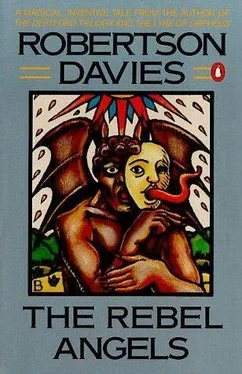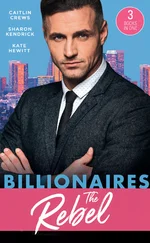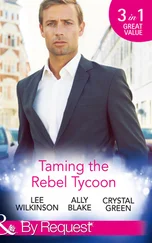Robertson Davies - The Rebel Angels
Здесь есть возможность читать онлайн «Robertson Davies - The Rebel Angels» весь текст электронной книги совершенно бесплатно (целиком полную версию без сокращений). В некоторых случаях можно слушать аудио, скачать через торрент в формате fb2 и присутствует краткое содержание. Жанр: Триллер, на английском языке. Описание произведения, (предисловие) а так же отзывы посетителей доступны на портале библиотеки ЛибКат.
- Название:The Rebel Angels
- Автор:
- Жанр:
- Год:неизвестен
- ISBN:нет данных
- Рейтинг книги:5 / 5. Голосов: 1
-
Избранное:Добавить в избранное
- Отзывы:
-
Ваша оценка:
- 100
- 1
- 2
- 3
- 4
- 5
The Rebel Angels: краткое содержание, описание и аннотация
Предлагаем к чтению аннотацию, описание, краткое содержание или предисловие (зависит от того, что написал сам автор книги «The Rebel Angels»). Если вы не нашли необходимую информацию о книге — напишите в комментариях, мы постараемся отыскать её.
The Rebel Angels — читать онлайн бесплатно полную книгу (весь текст) целиком
Ниже представлен текст книги, разбитый по страницам. Система сохранения места последней прочитанной страницы, позволяет с удобством читать онлайн бесплатно книгу «The Rebel Angels», без необходимости каждый раз заново искать на чём Вы остановились. Поставьте закладку, и сможете в любой момент перейти на страницу, на которой закончили чтение.
Интервал:
Закладка:
"Surely you know lots of people," I said. He was obviously well off; he drove a modest but expensive car. I supposed young men of means must know lots of girls.
"Not girls as beautiful as you," he said, but not in a way that suggested it was going to lead to further compliments, or any of that grappling which some men think is fair exchange for a meal.
I refuse to pretend that I don't like being told that I am beautiful. It is a fact, and though I would rather be the way I am than ugly, I don't pay much attention to it. Sooner or later almost all the men I know make some comment about it. So I decided that this pleasant, rather cool young man thought I was ornamental, and it was satisfactory to be seen in a restaurant with me, and that was a fair deal. I liked him better for being rich: he liked me better for being beautiful. Reasonable enough.
When I refused his second invitation, because I had to go to a special lecture, I thought that would be the end of it. But he asked me a third time, to dine and go to a symphony concert, and that surprised me a little, because he said nothing about music the first time we were alone together.
We went to a good restaurant, but not to one of the showy ones, and it was clear from the table we were given that Arthur was known there. It was a very good meal, from quite a different world of the imagination than the offerings of The Rude Plenty. I had made some effort about clothes, and did what I could to look well, and was prepared for another bout of food, politics, and travel, but he surprised me by talking about music. He seemed to have almost a patron's attitude towards it, which reminded me that he was the nephew of Francis Cornish. It was about his uncle he talked now.
"Uncle Frank has left his collection of musical manuscripts to the University; I wish he had left them to me. I'd like to do something in that line myself. Of course it's not difficult to buy manuscripts from modern composers, and I do a little in that way. But I would have liked to have his early things; there's a beauty about them – about the manuscript itself – that the modern works don't have. A lot of the early composers wrote the most exquisite musical hands. Had to, so that the copyist didn't get into trouble. But they also took pride in them."
"You mean you like the manuscript better than the music?"
"No, but there is a quiet beauty about a really fine original manuscript that is like nothing else. People buy manuscripts of authors and get great satisfaction from them, quite apart from any bibliographical interest they may have. Why not music? A Mendelssohn manuscript is wholly Mendelssohnian – precise, beautiful, just the tiniest bit conventional, and sensitive without being weak. It speaks of the man. And Berlioz! Fiery spirit, but splendidly legible, and dotted all over with directions in his handwriting, which is that of a man who was both a Romantic and the possessor of a thoroughgoing classical education. Bach – manuscript of a man who had to be careful with his ruled paper, which cost money he didn't want to spend. Beethoven – scribble, scribble, scribble. It's something of the man. My Uncle had some nice Liszt things, and I wish I had them. We're going to hear Liszt tonight. Egressy is playing the last three Hungarian Rhapsodies."
"I hate that kind of music."
"Really? Too bad."
"I'll turn off my ears while he's playing."
"What do you hate about it?"
"Everything. The spirit of it, the stress of emotion, the unchaste ornamentation."
"The very things I like."
"It's a change for you; I have it all the time."
"Theotoky; a Greek name, isn't it?"
"My Father's; but on my Mother's side I am a Gypsy, and being a Gypsy in the modern world – especially the University world – simply doesn't do."
"You don't like it in yourself?"
"I'd have to believe in heredity more than I do to admit there is much of it in myself. I'm a Canadian woman, setting out on a university career, and I don't want any part of the Gypsy world."
Now what on earth made me say that? I was surprised to hear myself. It sounded so aggressive, so much like the know-it-all girls I liked least at the University. I didn't want to go on with that theme; I had not meant to tell Arthur Cornish that I had Gypsy blood, because it sounded as if I were trying to make myself interesting in a cheap way. Let's drop that.
"Did you never tell your uncle you were interested in his musical manuscripts?"
"He knew I was."
"Isn't it odd that he didn't leave you even one of them?"
"Not odd at all. It's fatal to let a collector know you're interested in his things; he's quite likely to suspect you of coveting them. He begins to think you are waiting for them. I'll show him, says the collector, and bequeaths them to somebody else."
"What odd people collectors must be."
"Some of the oddest."
"How odd are you? But I suppose working with figures keeps you sane."
"Do I work with figures?"
"What else is working with money?"
"Oh – quite different. Money's something you shove around, like electricity."
"Like electricity?"
"Like large power-grids, and transformers, and that sort of thing. The diffusion of electricity is an extremely important kind of engineering. You decide where to put the energy, and how to get it there, according to the result you expect. Money is a form of power."
"A kind of power most people think they don't have enough of."
"That's quite different. The personal money people are always making such a fuss about depends heavily on where the big power-money is put – what bonds and industries get the heavy support, and when. People who aren't in the money trade talk about making money; they are able to do that because of the decisions people like me make about the power-money. The money people want for their personal use is all part of the big scheme, just as the electricity they turn on at a switch in their houses is a tiny part of what happens through the big grid. Brightens things up for them but it isn't much in the large scheme. What anybody can do with money for mere personal satisfaction is extremely limited. It's the power-money that's fascinating."
"It doesn't fascinate me."
"Not the power?"
"It's not my world."
"The University world is a power world, I suppose."
"Oh no, you don't understand universities. They're not just honeycombs of classrooms, where students are labelled this, that, and the other, so they can get better jobs than their parents. It's the world of research; the selfless pursuit of knowledge and sometimes of truth."
"Selfless?"
"Sometimes."
Of course I was thinking of Hollier, and how much I wanted to follow him.
"I can't judge, of course. I never went to a university."
"You didn't!"
"I'm a heavily disguised illiterate. I deceive lots of people. No B.A. – not to speak of an M.A. – yet I usually escape undetected. You won't turn me in, will you?"
"But – how have you -?"
"Where did I achieve my deceptive polish and ease in high-class conversation? In the University of Hard Knocks."
"Tell me about the U. of H.K."
"Not so very long ago there was a positive prejudice against university-trained people in the banking world, especially if they were expected to go to the top. What could a university give me that would be of any practical use? A degree in economics? You can learn economics better and quicker by reading a few books. A training in business administration? I was born to business administration. The rich gloss of cultivation? My guardians thought I could get that just as well by travelling and meeting a few Rothschilds and their like. So that's what I did."
"Guardians? Why guardians?"
"Oh, I had a Grandfather, and a fine old crusted money type he was. You'd have loathed him; he thought professors were fellows with holes in their pants who didn't notice the bad food they were eating because they were reading Greek at the same time. He's the one Uncle Frank escaped from. But my Father, who was a very good banker indeed, and not quite such a savage as Grandfather, married rather late, and having begot me was killed in a motor accident in which my young, beautiful Mother was killed too. So I had Grandfather, and guardians who were members of his banking entourage, and was to all intents and purposes an orphan. What's more, that despair of psychiatrists, a very rich orphan. I had no parents to humble me in the great Canadian upper-bourgeois tradition, to warn me against being myself, to urge me to be like them. So far as a civilized upbringing permits, I was free. And being free I found that I had no special urge towards rebellion, but rather, a pull towards orthodoxy. Now perhaps that's odd, if you are looking for oddity. I had a wonderfully happy childhood, suckled at the twin breasts of Trust and Equity. Then I travelled, and it was while travelling that I developed my great idea."
Читать дальшеИнтервал:
Закладка:
Похожие книги на «The Rebel Angels»
Представляем Вашему вниманию похожие книги на «The Rebel Angels» списком для выбора. Мы отобрали схожую по названию и смыслу литературу в надежде предоставить читателям больше вариантов отыскать новые, интересные, ещё непрочитанные произведения.
Обсуждение, отзывы о книге «The Rebel Angels» и просто собственные мнения читателей. Оставьте ваши комментарии, напишите, что Вы думаете о произведении, его смысле или главных героях. Укажите что конкретно понравилось, а что нет, и почему Вы так считаете.












